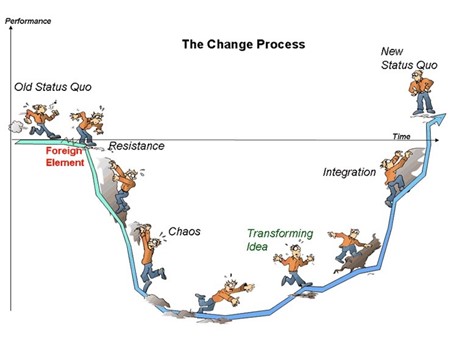Managing Change
Change is an inevitable part of everyday life.

Some changes are moment-to-moment, ongoing changes, like the weather. Some are one-off, significant changes, such as the end of an important relationship. Some changes pass us by without us even noticing, whereas others have a big impact on our lives and how we feel. We experience some changes as positive, some as negative and some as a mixture of both.
Sometimes change happens because we have instigated it and it is welcomed, other times change is out of our control and we have to learn to manage this in the best way that we can.
Change is a big part of University life, with typical changes including:
|
Studies |
|
Living Situation |
|
|
|
|
Relationships |
|
Health & lifestyle |
|
|
|
Why is change so challenging?
Often it isn’t the change itself that we find difficult, but the knock-on effects of the change.
Humans are designed to be adaptable but we all have limits. Change can be incredibly taxing, overwhelming and challenging. The potential negative impacts of change can make it feel very daunting. However, it is important to remember that change also brings positives and opportunities.
|
The Challenges of Change |
|
|
Practical Implications |
Change takes effort and can be pretty exhausting, often involving adapting existing strategies, learning new skills and undertaking a ‘trial and error’ approach. |
|
Psychological Difficulties |
Changes can result in us questioning ourselves and others. We can worry about our ability to cope with what is to come and dread what we will have to sacrifice in order to accommodate the change. |
|
Personal Growth |
Change gives you an opportunity to grow and develop. Learning new skills and having new experiences can be positive and enriching but only if you feel able and ready to take on new challenges. |
|
New Relationships |
A lot of changes will often involve meeting new people and forming new relationships. This can be both challenging and exciting depending on how confident you feel about making and sustaining connections with people. |
|
Stress |
Stress occurs when we feel our resources are insufficient to deal with what is being asked of us. Therefore, stress is particularly common when managing change as it’s a time when we often feel out of our depth and it can take time to feel confident again in our abilities. |
|
Emotions |
Often changes result in a wide range of emotional experiences which can be difficult, uncomfortable and overwhelming. |

The change process

This graph (adapted from John Fishers – The Process of Transition) shows the processes that people typically go through when they experience change. Each stage comes with a different emotional experience. Emotions are our way of understanding, and navigating through, our environment. They guide our responses and so act as a bit of a steering wheel. Emotions can be difficult to deal with and so we need to develop skills in understanding and managing them.
Feeling Overwhelmed by Change
When we feel stressed or overwhelmed, our behaviour, mood and habits change.
Learning what your 'warning signs' are will allow you spot early on when you feel overwhelmed and you are struggling to cope. At times like this, it’s important to take steps to prioritise your wellbeing to prevent things getting worse.
Common signs that someone is struggling include:
|
Energy |
|
Feeling tired, low in energy or restless |
|
Sleep |
|
Change in sleeping pattern – too much or too little, difficulty going to sleep, waking early, waking throughout the night, unsettled sleep |
|
Appetite |
|
Eating more, eating less, comfort eating, eating more fatty & sugary foods |
|
Irritability |
|
Feeling more irritable/snappy at others
|
|
Thinking |
|
Negative thinking – unable to stop thinking or worrying about things |
|
Concentration |
|
Difficulty concentrating, easily distracted |
|
Coping |
|
Feeling overwhelmed, struggling to cope
|
|
Engagement |
|
Withdrawing or avoiding – stopping things you would normally do |
|
Hopelessness |
|
Feeling hopeless – difficulty seeing feeling that things will improve or get better |
|
Mood |
|
Feeling anxious, low in mood
|
Developing Skills in Managing Change
Change is inevitable so developing skills in managing change is essential for positive wellbeing.
Being able to cope with change requires resilience [link to emotional resilience self-help page].
Managing Expectations
When experiencing change, it’s important to reflect on the situation and manage your expectations accordingly.
|
Acknowledge that things are changing
|
Sometimes we get so caught up in fighting change that we put off actually dealing with it. Denial is a powerful force, and it protects us in many ways. However, stepping outside of it and saying to yourself, "Things are changing, and it is okay" can be less stressful than putting it off. |
|
Realize that even good change can cause stress
|
Sometimes when people go through a positive life change, such as graduating and being accepted to University, they still feel a great deal of stress—or even dread. Keep in mind that positive change can create stress just like not-so-positive change. Stress is just your body's way of reacting to change. It's okay to feel stressed even when something good has happened—in fact, it's normal. |
|
Recognise what you can control & what you cannot |
You might not be able to control all aspects of a situation but you can control how you respond to it, where you use your energy and look after your wellbeing as best you can. |
|
Be realistic about how much you can deal with on your own |
No one gets through life alone. We all need support along the way. When things are feeling more stable, take time to identify your support options and get them in place early. |

Increasing Self Awareness
- Self awareness is all about knowing yourself – understanding your patterns, experiences and how you know when you are struggling.
- Developing good self awareness requires you to ‘go within’ and look at how you really experience your world in the moment – emotionally, physically, cognitively without judgement or expectation.
To develop your self awareness skills, visit our Mindfulness page

Managing Your Thinking
Our thoughts can be very influential in how we feel and how we approach situations. A single thought can be enough to set off a chain of emotional and physical experiences that then impacts how we behave in a situation. By using your self awareness skills, you can watch these processes and make sure that you are responding in the way that is going to be most helpful to you.

During times of change, our minds can often focus just on the negatives, assuming the worst or taking feelings as facts (e.g. I feel incapable, therefore I am incapable). The more this happens, the more it can affect our mood and it can be difficult to get out of the cycle of negative thoughts.
A good way of stopping this thought process and challenging these thoughts it to use the 'Catch It, Check it, Change It' technique.
|
Catch It |
Catch your thoughts and take notice of what they are saying |
|
Check it |
Check whether the thought is helpful or unhelpful to your current situation |
|
Change It |
You have the power to change your thoughts and invite yourself to shift your thinking towards more positive, helpful or realistic ideas |
